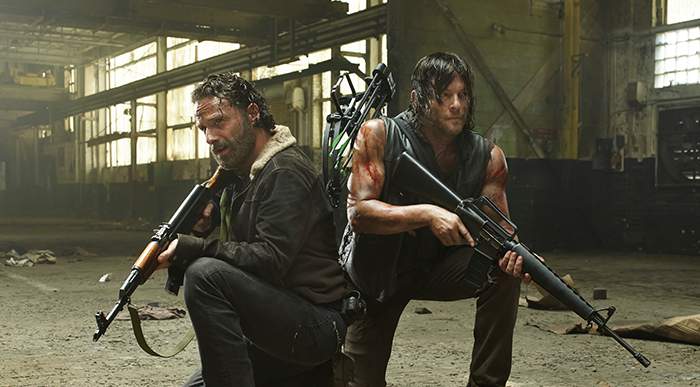America’s political class is deep into a long process of soul-searching marked by the refrain of “How the fuck did this happen?” The general consensus among those who have gotten past the denial stage of blaming Russians or Jill Stein or Millennials for Donald Trump’s victory is that the Hillary Clinton campaign ignored a wide swath of Americans in the parts of the country that don’t sell artisanal salad.
Though the initial response of artists has been and should be one of resistance, there may also be some space for reflection. If you find yourself, like so many others, drowning in the morass of awful news that has been released in the weeks since Trump’s election, you may have missed Jared Kushner (Trump in-law and member of the his campaign’s inner circle) saying that his campaign specifically targeted NCIS and The Walking Dead for campaign spots. NCIS doesn’t come as a surprise, as anyone with aging relatives knows that there are three things old people like: Cracker Barrel, CBS procedurals, and racism. The Walking Dead—now that’s interesting. Why would the Trump campaign find a desirable megaphone in prestige cable drama?
I am always surprised when kids I went to high school with post about any prestige TV on Facebook; my hometown is more of a Duck Dynasty and Big Bang Theory crowd. It was particularly surprising when I started to see almost all of them writing week after week about how excited they were for The Walking Dead and Sons of Anarchy. This got me tracking their ratings, and it turns out that as goes rural Pennsylvania so goes America. The Walking Dead has averaged 11.6 million viewers over its lifespan. While Sons of Anarchy wasn’t a megahit, the series ratings averaged over 4 million during its run. By contrast, Breaking Bad, Mad Men, Homeland, and Boardwalk Empire averaged around 2 million viewers. You might be tempted to call The Walking Dead and SOA outliers, but working-class shows like Justified, Shameless, and Rectify have all outperformed other shows of their size and scope to enjoy long runs, and appreciation from executives.
The data is there, so why aren’t the shows? I’ve worked on three shows in Hollywood: one about a wealthy family of New York socialites, another about a maverick heart surgeon, and the other about young A-list actors in love. You probably wouldn’t name these shows correctly on the second or third guess. I bet you would be able to tell me which show I meant if I said “rednecks kill zombies” and “a motorcycle gang reckons with a power struggle.” Some of the shows I’ve worked on have been hits; some haven’t. But, there is clearly a market inefficiency here. Why isn’t it being corrected?
First, we should look at the process of creating a television show. A writer who has had success on a previous existing show sells a new show to a network. The network buys X number of scripts. Out of those scripts, they produce Y number of pilots. Finally, Z number of shows go to series. It’s hard to find an exact number of pilot scripts that go to series, but it is safely under 10 percent. Given those odds, and that writers really like eating and paying rent, even the great tortured creative geniuses will skew their material to what they think will sell.
If you are an executive, your focus is to keep your job and make good shows, in that order. It stands to reason that you are going to pick the best scripts that your feel are a sure thing. We can criticize executives for playing it safe, but the only data we have about what will be a hit is what has worked in the past. Executives in TV, like executives in other businesses, receive their educations at top-tier schools and live in cities. Even if they left papa’s farm to make it in the big city, they have likely been away from papa’s farm for a long time. Given their past data, their personal experience, their current environment, and what they think their peers want to hear, it is reasonable that they would recommend the purchase of another Scandal or Ray Donovan.
Shows like Scandal often perform well. ABC’s drama department is ostensibly monopolized by Shonda Rhimes, who makes good shows about smart, rich, bohemian women succeeding in their career and in the bedroom. This is a tried and true formula that industry types like to call “wish fulfillment.” There are a few phrases you hear over and over again on network notes calls, and “wish fulfillment” is up there with “raise the stakes” as a phrase that would get you blind drunk after a five-minute-long drinking game.
The issue is not that we shouldn’t aim for wish fulfillment, but that perhaps we should expand our definition of wish fulfillment. The mold of “rich person behaving badly” has been played out in the Mafia, the meth trade, Prohibition-era Atlantic City, Silicon Valley, Hollywood, DC, Westeros, Space, the Cold War, cable news, Tudor England, Ancient Rome, and innumerable other locales. It turns out that killing zombies with a crossbow, tossing a molotov cocktail from a motorcycle, and fucking hot vampires on the banks of the Bayou are also forms of wish fulfillment. Wish fulfillment and stakes can be tied to wealth but they don’t have to be. In fact, viewing conspicuous consumption as the only form of power robs you of so much potential drama.
This is a lesson the comedy has learned much better than drama. Eileen Heisler, creator of the working-class comedy The Middle, spoke to KCRW’s The Treatment about wish fulfillment. She said, “I kind of miss the Midwest. Where if you’re in trouble they stop by with a tuna casserole. Small family, neighbor kind of moments was our kind of wish fulfillment.” This lesson was taught by Cheers and Roseanne, and comedy writers haven’t forgotten it.
Hopefully, television in the era of Trump will be an era of creativity. I’m sure that the next crop of network pilots will respond to the Trump presidency with a slew of comedies about white men who feel pushed around by PC culture, and a bunch of dramas where soldiers and cops shoot brown people. Hopefully, cable can strive for something better. Not only would it benefit Netflix, FX, and HBO to push themselves outside of Brooklyn, Los Angeles, Westeros, and a futuristic theme park that costs $40,000 a day, but it would benefit culture as a whole. It’s naive to think that television will somehow totally bridge the culture gap, but different types of stories that offer new perspectives could be the beginning of some semblance of understanding between the numerous Americas currently contained within the United States.
At the very least, with each new story, there is a new audience seeing their wishes fulfilled in a way they never thought possible.











